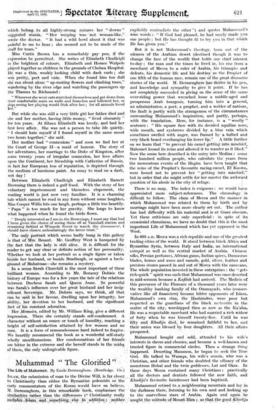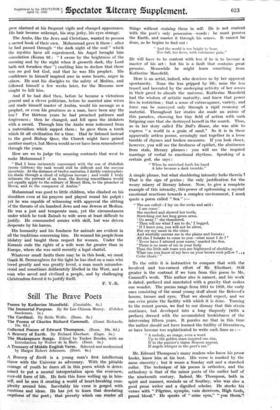Muhammad " The Glorified"
The Life of Mahomet. By Emile Dermenghem. (Routledge. 15s.) ISLAM, the submission of man to the Divine Will, is far closer. to Christianity than either the Byzantine polemists or the early commentators of the Koran would have us believe. M. Dermenghern, in this remarkable book, emphasizes the rather than the differences (" Christianity really includes -Tslainn and_ something: inadditIon..; neither
_ _
explicitly contradicts the other ") and quotes Muhammad's - *lose- words "If God had pleased, he hid surely made you one people ; but He has thought fit to try you in that which He has given you."
But it is not Muhammad's theology, born out of the silences of the Arabian desert (destined though it was to change the faee of" the world) that holds our chief interest to-day ; the man and the times he liVed in, his rise from a merchant of Mecca to a ruler of Arabia, his triumphs and defeats, his domestic life and his destiny'. as the Prophet of one fifth of the human race, remain one of the great dramatic stories of the world. M. Dermenghem theatre in his pen, and knowledge and sympathy to give it point. If he has not completely succeeded in giving us_ the sense of the same over-riding power that wrenched loose a middle-aged and prosperous Arab bourgeois, turning him into a general; an administrator, a poet, a prophet, and a welder of nations; the fault is partly with the strangeness of the circumstances surrounding Muhammad's inspiration, and partly, perhaps, with the translation. Here, for instance, is a " woolly " sentence : " His square face with its- decided aquiline nose; Wide . mouth, and eyebrows divided by. a blue vein which sometimes swelled with anger, was framed by a tufted and very black beard overhanging his lower lip." A little further on we learn that " to prevent his -camel getting into mischief, Mahomet loosed its reins and allowed it to wander as it liked." Now the scene here described is the entry into Medina : sonic two hundred million people, who calculate the years from the momentous events of the Hegira have been taught that the reins .of the. Prophet's favourite racing-camel, El Kasva, were loosed not to prevent her " getting into mischief," but in order that she might settle for her master the awkward question of his abode in the city of refuge.
There is no map. The index is exiguous : we would 'have appreciated more subject-references. The chronology ; is difficult to follow. The dans of Mecca and the manner'. in which Muhammad • was related tiff them by • birth and by marriage might have been more clearly set out. The author has had difficulty with his material, and ,is at times obscure. Yet these criticisms are only superficial : in spite of Its Occasional clumsiness, we have no doubt:that this is the most important Life of Muhammad which has yet appeared in the N
-
In 600 A.D. Mecca was, a rich republic and one of the greatest trading Cities of the world. It stood between black Africa and Byzantine :Syria, between Italy and -India, an international eatrepot as well as the central market of Arabia. Chinese silks, Persian perfumes, African gums, Indian spices, Damaseus blades, horses and asses and carnets, gold, silver, leather and precious stones passed in and out of. Mecca with the caravans: The whole population invested in these enterprises : the " get- rich-quick " spirit was such that Muhammad was once deserted in mid-sermon because a Kafilah had arrived. The Medicis of this precursor of the Florence of a thousand years later were the wealthy banking family of the Onunayads, who (conser- vative like all financiers) became bitter opponents of Islam. Muhammad's own clan, the ilashin. tites, were poor but respected as the guardiana of the black' meteorite in the centre of the city, worshipped then as now as the Kit'aba. He was a respectable Merchant who had married a rich widow of forty when he was himself twenty-ilye. Until he was fifty and Khadija died; he remained faithfril to her, and their union was blessed by four daughters. All their affairs prospered.
Muhammad bought and sold, attended to his wife's interests in slaves and ebonies, and became a well-known and trusted figure in commercial circles. Then a strange thing happened. Deserting Mammon, he began to seek the True God. He talked to Waraqa, his wife's cousin, who was a Christian, and other friends who doubted the efficacy of the monstrous Hobal and the twin goddesses, Lat and Ozza. In those days Mecca contained many Christians : practically all the doctors and dentists followed the new faith, and Khadija's favourite hairdresser had been baptized.
Muhammad retired to a neighbouring mountain and lay in - the- darkness there, listening to his own soul and looking up to the marvellous stars of Arabia. Again and again he sought the solitude of Mount Hira ; so that the good Khadija
grew alarmed at his frequent vigils and changed appearance. His hair became unkempt, his step jerky, his eyes strtinge: - The Arabs, like the Jews and Christians, wanted to possess a sacred book of their own. Muhammad gave it them : after he had passed through " the dark night of the soul " which the mystics have all experienced, his Angel brought him consolation (Koran 93 : " I swear by the brightness of the morning and by the night when it groweth dark, thy Lord hath not forsaken thee ") enabling him to declare that there Was no god but God, and that he was His prophet. His confidence in himself inspired awe in some hearts, anger in others. He sent his disciples to the safety of Medina, and followed himself a few weeks later, for the Meccans now sought to kill him.
And if he had died then, before he became a victorious general and a clever politician, before he married nine wives and made himself master of Arabia, would his message as a prophet, or even his greatness as a man, have been any the less ? For thirteen years he had preached patience and forgiveness ; then he changed, and fell upon the idolaters With a sword. Through him the Arabs were redeemed from a materialism which sapped them ; he gave them a torch which lit all civilization for a time. -Had he listened instead to :the good Bishop Quss, the Church might have gained another martyr, but Mecca would never have been remembered through the years.
How are we to judge the amazing contrasts that went to make Muhammad ? •
" Had I been intimately conversant with the son of Abdullah (wrote Gibbon) the task would still be difficult and the success uncertain.- At the distance of twelve centuries, I darkly contemplate his -shade through a cloud of religious incense ; and could I truly delineate the portrait of- an hour, the fleeting resemblance would not: equally apply to the solitary of Mount Him, to the preacher of Mecca, and to the conqueror of Arabia."
- Muhammad was good to little children, who climbed on his shoulders even at his prayers and played round his pulpit ; yet he was capable of witnessing with approval the slitting of the throats of six hundred Jews and one Jewess at Medina. He was a just and temperate man, yet the circumstances under which he took Zainab to wife seem at least difficult to justify. He commanded armies with skill, but was driven desperate by his harem. - -His humanity and his fondness for animals are evident in all the traditions concerning him. He weaned his peoplerfroM
idolatry and taught them respect for women. Under the Koranic code the rights of a wife were far greater than in EUrope, *here she was until recently dlegal chattel.
Whatever- small 'Wilts there may be in this book, we must thank M. Dernierighein for the light be has shed on a man who loved greatly and was greatly loved, e man much misunder- stood and sometimes_ deliberately libelled in the West, and a man who saved and civilized a people, and by challenging
Christendom forced it to justify itSelf. " - • - F. Y.-B.



























































 Previous page
Previous page